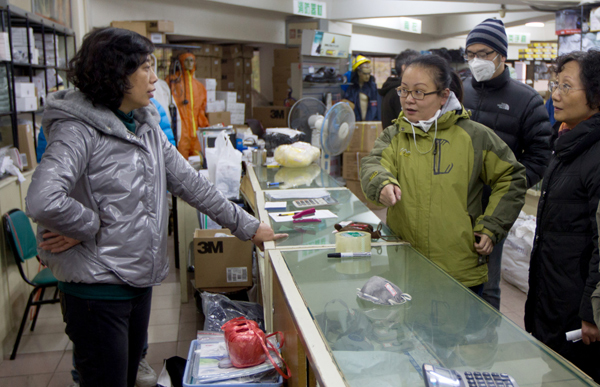Ripple effects of air pollution felt in many sectors
 0 Comment(s)
0 Comment(s) Print
Print E-mail China Daily, December 10, 2013
E-mail China Daily, December 10, 2013
Heavy air pollution is taking its toll on Shanghai's department stores and shopping malls as people reduce their outdoor activities.
By contrast, the number of tourists opting for vacations on islands and in forests that promise fresh air away from the suffocating haze is on the rise.
 |
|
Protective masks sell out at a store in Shanghai on Monday as demand increases. The city has been shrouded in smog for a week. |
Following Friday's record air pollution levels, Shanghai was shrouded once again in acrid smog on Monday. The air quality index published by the US Consulate stood at 442 ("hazardous") at 7 am, falling to 185 ("unhealthy") by 5 pm. The figures reported by the Shanghai Environmental Monitoring Center were 179 and 238 at those same times.
It was hoped that a cold front and associated winds from northern China would blow dust particles out of the city, but the front failed to reduce Shanghai's pollution on Monday.
"That's because the pollutants that have accumulated these days cannot be blown away in one shot," said Wu Rui, a meteorologist at the Shanghai Meteorological Bureau.
The cold front actually carried pollutants in from Jiangsu and Anhui provinces, which are meteorologically upstream. Those places also experienced heavy air pollution in recent days, Wu said.
Pollution levels in Shanghai are expected to see a major improvement beginning Tuesday because the cold front has helped scour the air in the northern cities.
In Beijing, the official air quality index reading stood at a mere 11 as of 5 pm on Monday, meaning the city's air quality was excellent.
"The direction and speed of the wind from the north is more favorable to Shanghai, and will dramatically improve its air quality," Wu said. "Visibility keeps getting better."
The severe pollution, which has prompted some expatriates to reconsider their long-term plans to stay in Shanghai, has also reduced customers at major shopping malls and markets, according to media reports. But that's not necessarily forcing changes to sales strategies.
"As far as I know, Ikea has not changed its strategy because of the air pollution," said Emma Liu, a public relations officer for the Swedish furniture provider. "But we are celebrating our 15th anniversary in China these days with big discounts, and that encourages customers to shop more in the smoggy weather."
Local media quoted unidentified sources as saying that some department stores in Shanghai had experienced stagnant sales over the weekend despite year-end promotions.
In at least two sectors, business improved as people became less willing to go outdoors into hazardous air. Catering businesses in Shanghai saw a big increase in their food-delivery services, for example, while restaurants saw a rise in the consumption of mu'er, or fungus, which is believed to moisten lungs and alleviate the effects of inhaled pollutants.






Go to Forum >>0 Comment(s)